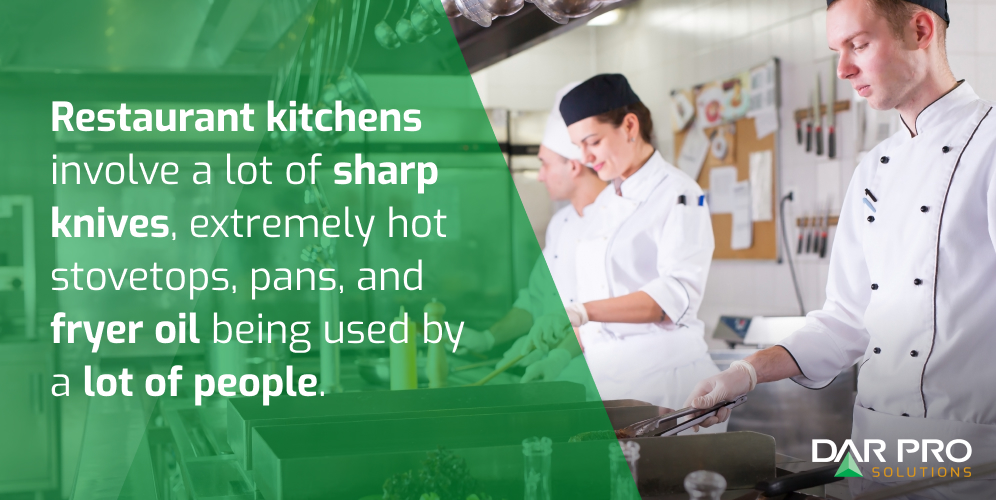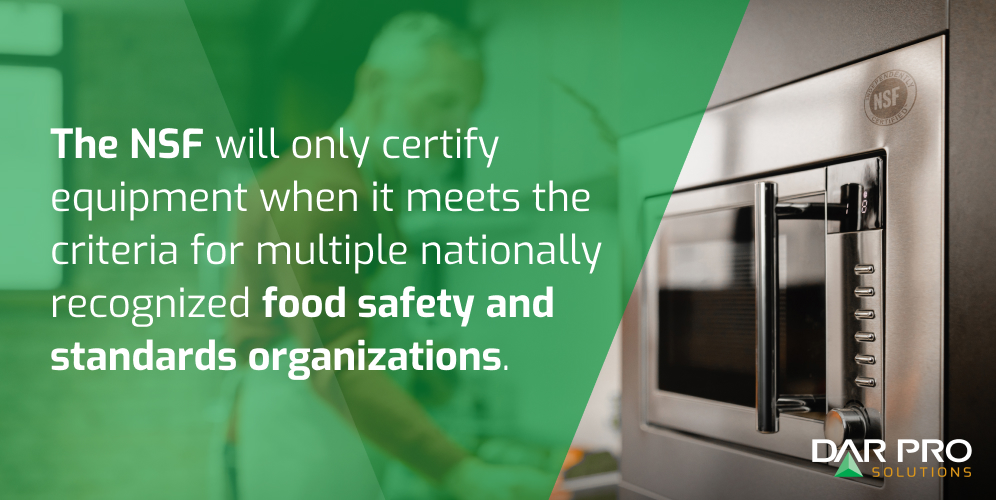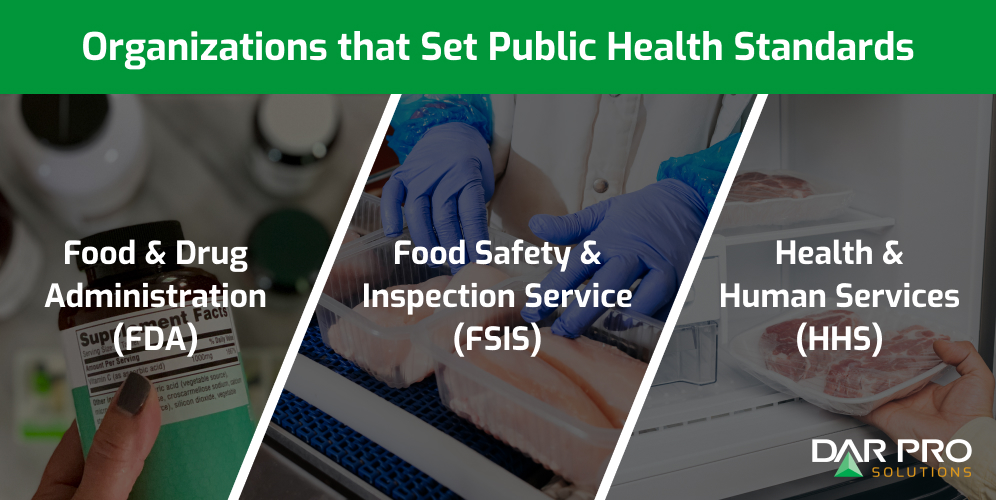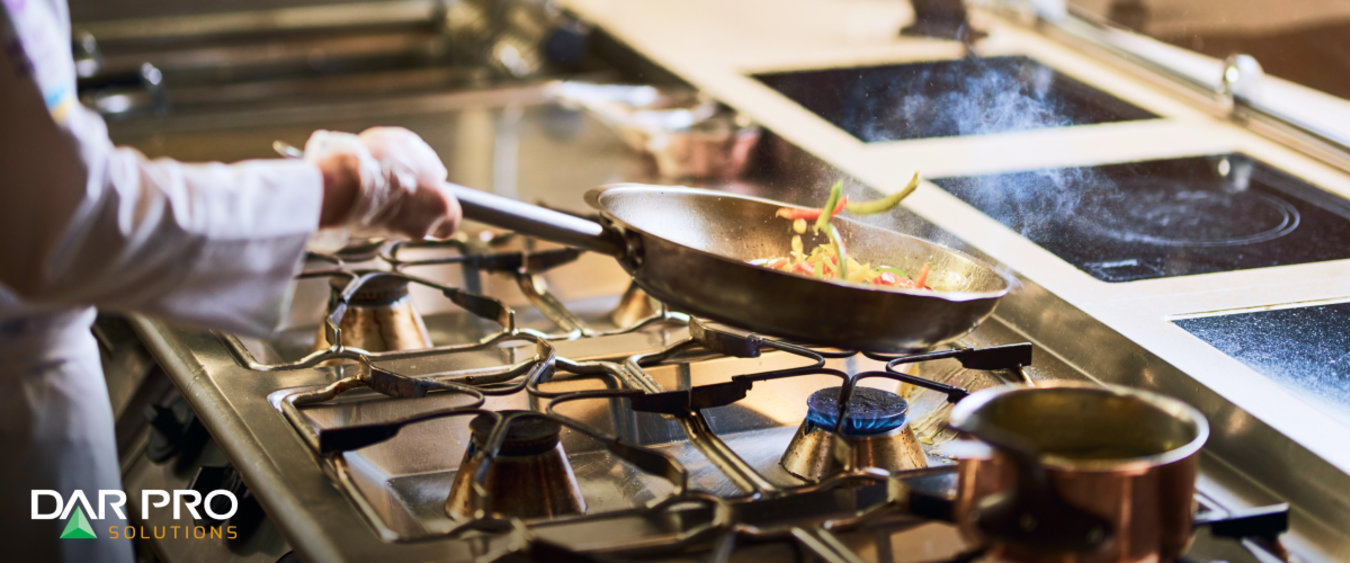Why Is Restaurant Safety So Important?
Many consumers forget that restaurant kitchens are more robust versions of what they have at home. They involve a lot of sharp knives, extremely hot stovetops, pans, and fryer oil being used by a lot of people—all of which can cause significant cuts and burns. Couple that with a risk of slipping hazards from water or grease, and even the best-run kitchens have their accidents from time to time.
Restaurant safety has to cover both the customers and employees. High-quality standards for equipment reduce possible food-borne pathogens and other hazards to staff or patrons.

What Agency Enforces Restaurant Food Safety?
Several organizations are responsible for keeping both customers and employees safe. They each have their own area of focus, but they all emphasize kitchen safety.
Even agencies that focus on food safety will inspect kitchen equipment. If the equipment isn’t able to hold or prepare food in a safe way, then it falls below standards. This could include faulty temperature regulation, broken and chipping pieces, no insulation, or other liabilities.
The primary organization for food equipment standards is the National Sanitation Foundation (NSF). They are an independent entity that certifies kitchen equipment and consumables across many industries.
The Occupational Safety and Health Administration, or OSHA, oversees safety procedures for kitchen employees.
The governmental agencies that regulate public health standards are the Food and Drug Administration (FDA), The Food Safety and Inspection Service from the US Department of Agriculture (FSIS, USDA), and the US Department of Health and Human Services (HHS).
NSF Standards
Chefs and owners aren’t responsible for getting their equipment inspected—these certifications happen before the equipment is ever sold. The NSF will only certify equipment when it meets the criteria for multiple nationally recognized food safety and standards organizations.
By purchasing kitchen equipment with an NSF certification, chefs and owners know that what they bought is high-quality and can ace any health inspection. They also do audits all along the supply chain, so even the food you receive from a supplier may have their standard guarantee.
The NSF focuses on two primary components of kitchen equipment safety: sanitation and electrical.

Sanitation
The NSF works with the American National Standards Institute, or the ANSI, to establish standards for kitchen and all food handling equipment. NSF/ANSI 2 ensures the sanitation of kitchen equipment for the safety of patrons.
The three sanitation components that the NSF tests for are:
- Hygienic design, ensuring that all components are cleanable.
- Material safety, ensuring that no chemicals or materials are leached into food.
- Performance, ensuring that equipment performs designed functions like holding food at safe temperatures.
Using a product that has passed these sanitation requirements indicates a certain quality guarantee.
Electric
Any equipment with an electric component needs to pass inspection according to the National Electric Code. The NSF works with the Nationally Recognized Testing Laboratory, or the NRTL, to test if the kitchen equipment complies with the code.
While the sanitation aspect of NSF-certified equipment is focused on food sanitation and customer safety, the electric portion focuses on staff safety. Restaurant kitchens have a lot of electrical appliances, and faulty equipment could be a recipe for disaster.
Public Health Standards
While the NSF ensures the meeting of public health standards, various governmental organizations decide what exactly those health standards are.
Food and Drug Administration
The FDA focuses on what is fit for consumption, as opposed to sanitation standards. They also review perishable food items—particularly imported foods—as well as cosmetics and dietary supplements. They set compliance programs to ensure that any food distributed for sale is safe.
Food Safety and Inspection Service
The FSIS is a branch of the US Department of Agriculture (USDA) that sets the requirements for handling and labeling meat, poultry, and egg products. They mostly inspect slaughterhouses and processing facilities, but FSIS is also at the forefront of regulating humane slaughtering practices as well as individual and restaurant food safety.
Health and Human Services
When restaurants receive a notice that a health inspector is on their way, they have to ensure they’re compliant with U.S. Department of Health and Human Services (HHS) standards. Now, health inspectors don’t tend to report to the national HHS, but they do work for the health departments for local municipalities. These local health departments create their standards based on guidelines from the HHS.
Much of what local health departments look for are handwashing, labeling food, and making sure food is stored at the correct temperature. Basically, they are looking for whatever may be a public health hazard or a potential for food borne illnesses.

OSHA Standards
When it comes to protecting employees, the Occupational Safety and Health Administration (OSHA) sets the standards across all kinds of industries. Even front-of-house (FOH) employees need to go into the kitchen from time to time, and it’s important to reduce the risk of injury for everyone who uses that space.
This not only applies to equipment being in top shape, but cleanliness in all areas.
A Safe Kitchen Starts With DAR PRO
There’s one easy place to begin focusing on kitchen safety: your grease trap and used cooking oil system. When DAR PRO Solutions handles your kitchen waste, you reduce the risk of both cross-contamination and injury.
Let us install a UCO container, and clean it (and your grease trap!) according to your schedule. It’s how we help make restaurant safety hassle-free! Let’s make running your kitchen a little easier, and safer together. Call us today at (855) 327-7761.
Contact Sales
For customer service inquiries call our toll free number (855) 327-7761
By submitting this form I agree to the privacy policy including the usage of contact details to contact me for marketing purposes.
